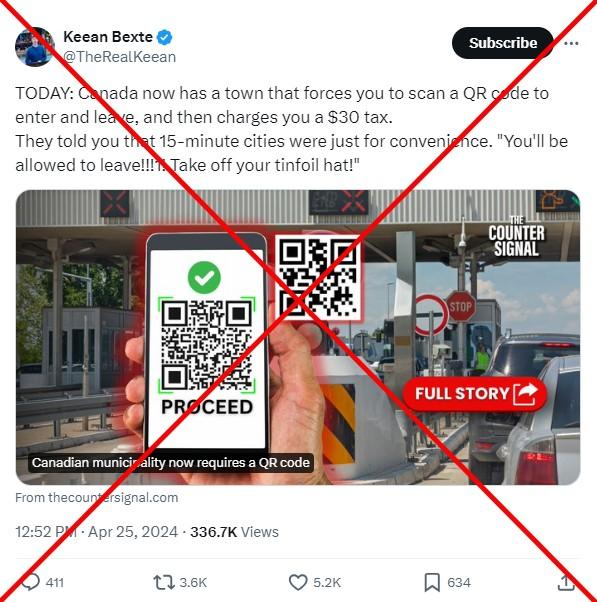
Canadian tourist pass reignites unfounded surveillance conspiracy theories
- This article is more than one year old.
- Published on May 6, 2024 at 17:10
- Updated on May 16, 2024 at 19:53
- 4 min read
- By Gwen Roley, AFP Canada
"Canadian municipality now requires a QR code to enter or leave," said an April 27 post on X. "The very first QR code PRISON is in Canada."
Other users linked the plan to the idea of a "15-minute city," recirculating false claims that the urban planning concept is part of an effort to track and control residents.
"Les Îles-de-la-Madeleine, QC (Magdalen Islands) are set to become Canada's first '15 minute City,'" an April 25, 2024 post on X claims.
After the appearance of tense footage depicting a municipal council meeting, posts in English and French on platforms including Facebook, Instagram and TikTok spread the claim that citizens and visitors would have to give up private information in order to leave.


The claims follow similar theories fact-checked by AFP which purported that 15-minute cities are being developed to restrict movements and track residents.
However, experts have repeatedly said that a 15-minute city is an urban planning model that includes all essentials within a short trip and does not impede movement.
The Magdalen Islands, a remote archipelago in the Gulf of Saint Lawrence facing accelerated climate change effects, will be deploying a new Can$30 (USD$21.93) tourist tax called Archipel Pass. It will go towards a sustainable land management fund, according to the islands' tourism website (archived here).
Isabelle Cummings, a spokeswoman for the Magdalen Islands municipality, said visitors will have the option to pay the duty online and receive a QR code to present before leaving by plane or ferry.
"No QR code information or personal information is collected, accumulated or used by the municipality without the user's consent," Cummings said in a May 2 email.
The initial plan included a possible fine for those refusing to pay after a municipal court hearing, but on May 14, the municipality announced in a press release that the payment of the fee would be optional for 2024, after it could not complete operational negotiations with Transports Canada in time for the start of the tourist season.
'Management tool'
Cummings said payments would be processed through a secondary company that asks for contact information -- as do most online credit card processors -- but this information is not shared with the municipality.
For those without smartphones, Cummings said it would be possible to print the confirmation email containing the QR code to present upon leaving and the tourism website said payment can be made to the verification agent.
While many of the misleading posts claim the code would be mandatory upon entry and exit, Cummings said it would only have to be presented when leaving.
Residents of the Magdalen Islands are exempt from the tax and could bypass the code by presenting proof of address, such as a driver's license. The tax also only applies to people who stay longer than 24 hours during the months from May to mid-October.
Venice, another popular travel destination, introduced a tourist tax in 2024 similar to Archipel Pass which also employs a QR code for proof of payment, but the Italian city has reportedly been tracking cell phone data to help regulate the volume of visitors in busy areas for years.
Cummings said Archipel Pass's QR Code would not be used to track users.
"No marketing or other action is involved in the use of the QR code," she added.
David Murakami Wood, a professor with the Centre for Law, Technology and Society at the University of Ottawa (archived here), was hesitant to qualify the QR codes as harmful surveillance tools because they simply link to a URL or another piece of data (archived here).
"It's such a simple technology, it's really just a management tool," he said.
Murakami Wood also said there are few similarities between the Archipel Pass system and the 15-minute city planning philosophy.
The Magdalen Islands appear to be focused on creating a process to protect the natural environment and making "sure there's actually revenue to deal with the problems caused by tourism," he said.
City planning misinformation
Municipalities across Canada are looking at how to leverage technology to monitor transport, cut greenhouse gas emissions and improve residents' quality of life, but the adoption of new "smart" devices has led to concerns about surveillance and is sometimes invoked in unfounded city planning claims.
Murakami Wood said that QR code scanning could be deployed in a smart city, but the system proposed in the Magdalen Islands does not raise the risk of unsuspected data collection.
"In the sense that it's a surveillance system, it's one of the most basic ones you can imagine and one of the least harmful and damaging effects," he said.
The QR code does not link to any personal information beyond what a user has agreed to share, he said. "It's just a convenient way of showing that you've paid the tourism charge."
Read more of AFP's reporting on misinformation in Canada here.
Updates were made throughout to reflect a May 14 announcement that the Archipel Pass is optional for 2024.May 16, 2024 Updates were made throughout to reflect a May 14 announcement that the Archipel Pass is optional for 2024.
Copyright © AFP 2017-2026. Any commercial use of this content requires a subscription. Click here to find out more.
Is there content that you would like AFP to fact-check? Get in touch.
Contact us
